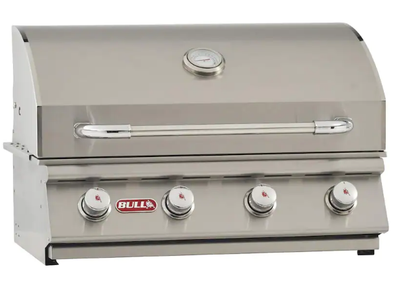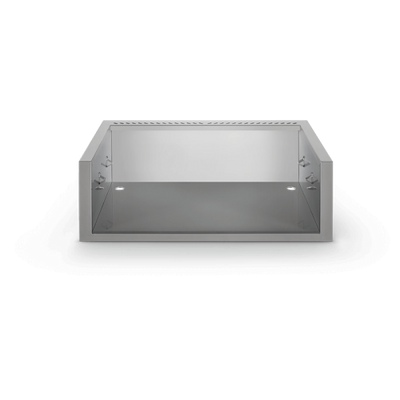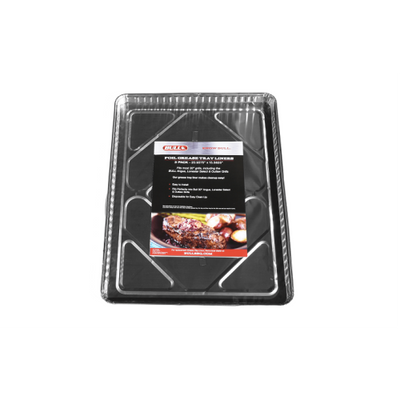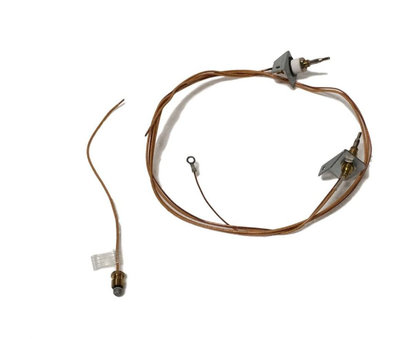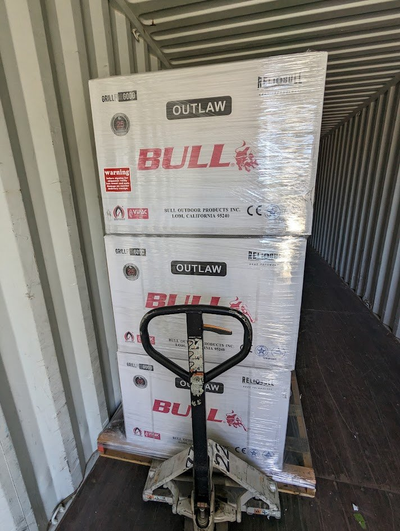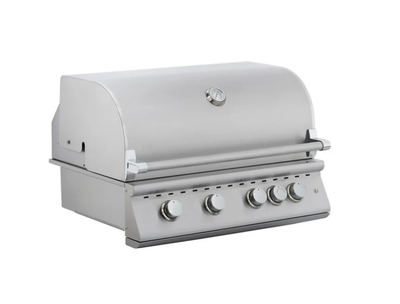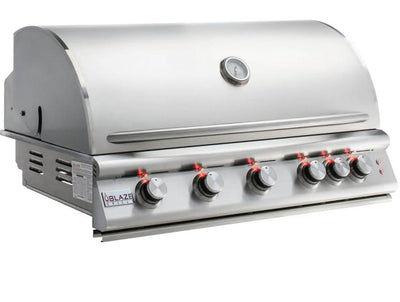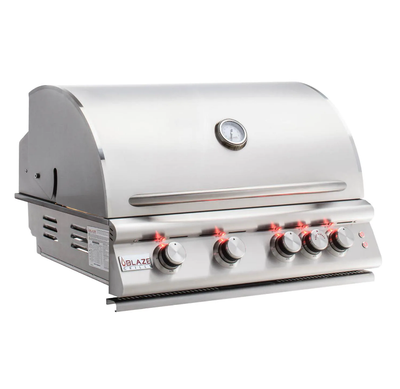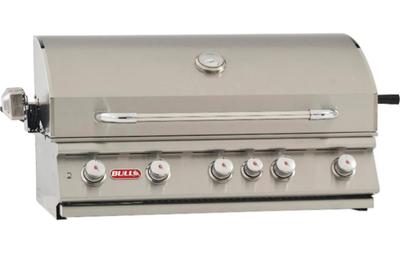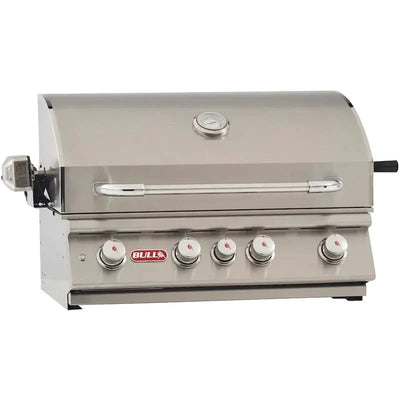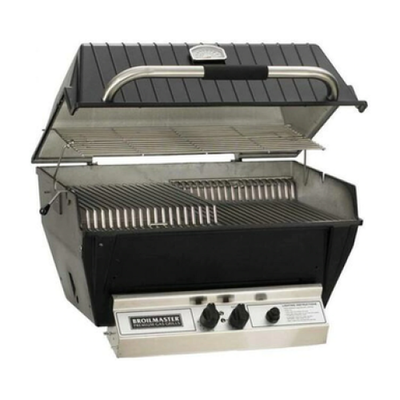Top Benefits of Natural Gas Grills for Your Outdoor Kitchen

The benefits of natural gas grills make them an excellent choice for elevating your outdoor cooking experience. In recent years, gas grills have gained popularity, especially during the summer months, due to their convenience and minimal cleanup.
Among the available options, natural gas grills stand out for their efficiency, eco-friendliness, and hassle-free operation.
In this blog, we'll explore why a natural gas grill is a smart addition to your outdoor kitchen, helping you make the best choice for your backyard setup.

Why Choose a Natural Gas Grill?
When it comes to grilling, you have several choices: charcoal, propane, or natural gas. While each has its own merits, natural gas grills offer a unique combination of benefits that make them a top contender for many outdoor cooking enthusiasts.
According to a consumer survey, gas grills are the most popular, with 64% of people choosing this type of grill. So what makes a natural gas grill so appealing? Let's dive into the specifics.
-
Unmatched Convenience
One of the most significant advantages of a natural gas grill is its unparalleled convenience. Unlike propane grills, which rely on tanks that need refilling, a natural gas grill connects directly to your home's gas line. This eliminates the hassle of running out of fuel mid-cookout.
You can say goodbye to the days of lugging heavy propane tanks and worrying about backups. With a natural gas grill, you can enjoy a continuous and reliable fuel supply, making your grilling experience seamless and stress-free.
It is also convenient because natural gas grills heat up quickly, allowing you to get to cooking faster. You simply turn the knob, ignite, and you’re ready to grill.
-
Reliability You Can Count On
When it comes to reliable outdoor cooking options, natural gas grills truly shine. Propane tanks can run out unexpectedly, disrupting your cooking plans. However, a natural gas grill, when properly installed and maintained, offers a steady supply of fuel whenever you need it.
You can trust it to deliver consistent performance, ensuring your dishes are cooked to perfection every time. The quick start-up time and consistent fuel supply make natural gas grills a reliable option for outdoor cooking.
-
Durability and Longevity
Natural gas grills are designed to withstand the rigors of outdoor use. Many are constructed from durable materials like stainless steel, resistant to high temperatures, weather, and corrosion.
While some models use cast iron, ceramic, or aluminum, stainless steel is the most durable option. Investing in a quality natural gas grill means getting a long-lasting piece of equipment that can provide years of grilling pleasure.
-
Energy Efficiency
The benefits of natural gas grills extend to their impressive energy efficiency. Natural gas is a cleaner-burning fuel compared to propane or charcoal. This results in less pollution and a more economical operation.
The efficient burn also translates to lower running costs, especially if you frequently engage in outdoor cooking. You’re not only being more eco-conscious, but you're also saving money.
-
User-Friendly Experience
Natural gas grills are incredibly user-friendly. They ignite quickly and offer precise temperature control similar to an indoor stovetop. The adjustable knobs allow you to easily control temperature and flame size, so you can adjust the heat levels to suit your cooking needs and prevent your food from burning.
This level of control is essential for both slow-cooking and high-heat searing. The controls are responsive and allow you to set the grill at the right temperature.
-
Low Maintenance
Another compelling advantage of natural gas grills is their low maintenance requirements. Since they don’t rely on propane tanks, there are no tanks to refill or exchange, so you won't have to worry about storing them.
Natural gas grills also produce less ash and residue compared to charcoal grills, making cleanup easier and faster. The grates and grease traps are also easily cleaned.
This ease of maintenance ensures you spend less time cleaning and more time enjoying your meals.
-
Eco-Friendly Outdoor Grilling
Choosing a natural gas grill is a step towards eco-friendly outdoor grilling. Natural gas is a clean-burning fuel that produces fewer greenhouse gas emissions compared to propane or charcoal. By reducing your carbon footprint, you’re making a sustainable choice for the environment while still enjoying delicious grilled foods.
This also ties into the efficiency, as the cleaner burn is also more efficient.
-
Cost-Effective Solution
In the long run, natural gas grills prove to be a cost-effective grilling solution. Although the initial installation might cost, the long-term benefits outweigh it. Natural gas is typically less expensive than propane, and you won't have the recurring expense of tank refills.
By eliminating the constant need for propane refills, you save money and time. The fuel efficiency of natural gas also means you’re not spending more than you need to on fuel.
-
Safety Features
Safety is a crucial consideration when using any type of grill. Natural gas grills come equipped with several safety features that provide peace of mind. These include flame control knobs, automatic shut-off valves, heat distribution plates, and pressure regulators.
These features help to reduce flare-ups, prevent gas build-up, and ensure consistent heat distribution, making your outdoor cooking experience safer. The heat distribution system reduces fire hazards by ensuring predictable heat.
Natural gas grills eliminate the risk of propane tank leaks or explosions and typically have an additional shut-off valve for additional safety.

How Does a Natural Gas Grill Work?
Understanding how a natural gas grill works can help you appreciate its design and functionality.
The process is relatively straightforward:
-
Fuel source: The grill is connected to your home’s natural gas line, which supplies the fuel. The gas flows through the line and enters the grill through a valve.
-
Ignition: The gas is ignited by a spark or pilot light, creating a flame that heats the grill.
-
Burner: The burners distribute the heat evenly across the grill grates, ensuring your food is cooked thoroughly. The number and size of the burners vary depending on the grill model.

To start taking advantage of the benefits of natural gas grills, you can connect them to your home's gas line. If you don't already have an outdoor gas line, you'll need to have one installed by a professional. This is not a DIY project.
Regulations around gas line installations vary, but a licensed technician will be familiar with the local requirements. The professional can install the line safely and ensure it meets all local safety standards.
When it comes to installation there are some factors that affect cost. The distance from your gas line to your grill, path obstructions, and local permits will all have an impact.
Generally, the installation involves the following steps:
-
Identifying the closest gas pipe and getting measurements.
-
Installing a T-fitting with airtight connections and a shut-off valve.
-
Extending the gas line outdoors to the stub-out point.
-
Setting up a gas valve.
-
Having the gas line inspected.
-
Testing all the connections for leaks.
-
Finally, connect the grill. If you already have a propane grill but wish to connect it to your home’s natural gas, you have a couple of options. You can convert your grill or get a new natural gas grill. When converting your grill it is important to use a manufacturer-approved kit and make the change carefully.

Natural Gas vs. Propane Grills
The debate between natural gas vs. propane grills often comes down to individual needs and preferences. While both are excellent choices for outdoor grilling, they have key differences:
-
Fuel Supply: Natural gas grills connect directly to a gas line, offering a continuous fuel supply, while propane grills rely on tanks that need to be refilled.
-
Cost: Natural gas is generally cheaper than propane.
-
Convenience: Natural gas eliminates the need for tank refills, making it more convenient.
-
Reliability: Natural gas offers a more reliable fuel supply without the risk of running out unexpectedly.
-
Environmental Impact: Natural gas is more eco-friendly than propane because it burns more cleanly.

Enhance Your Outdoor Cooking Experience
A natural gas grill is the perfect upgrade for your outdoor kitchen, offering convenience and efficiency for all your grilling needs. Many come with grilling accessories to enhance your cooking experience.
It can easily turn your outdoor kitchen into the hottest place year-round. The convenience, reliability, and cost-effectiveness make it an excellent option for grilling enthusiasts.
Conclusion
The benefits of natural gas grills are clear, offering a compelling combination of convenience, reliability, efficiency, and safety. With a constant fuel supply, precise temperature control, and low maintenance, a natural gas grill can transform your outdoor cooking experience.
They are also a cost-effective and eco-friendly choice for grilling. If you're looking to upgrade your outdoor setup, it’s time to consider the many benefits of a natural gas grill. They are a great investment that will make your outdoor cooking a success.
Ready to elevate your grilling game? At Outdoor Kitchen Outlet, we offer a wide selection of premium natural gas grills designed to meet all your outdoor cooking needs.
Call us today at (888) 667-4986 to find the perfect grill for your backyard. Our experts are here to help you make the best choice for your outdoor kitchen!
 - Call
- Call 

